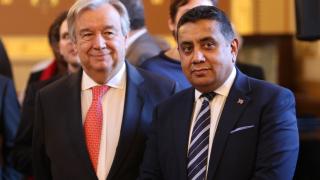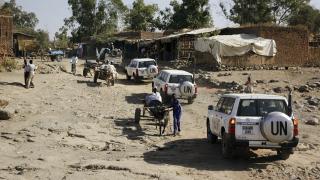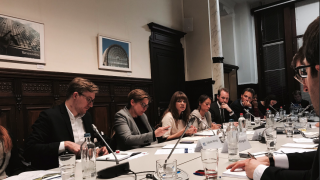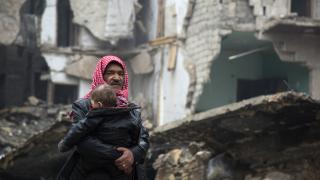
Following extensive civil society campaigning from UNA-UK, Protection Approaches, and other members of the UK’s Atrocity Prevention Working Group, the Foreign Office has today published a guidance note outlining its approach to atrocity prevention.
While this note does not constitute an atrocity prevention strategy, as called for by the Foreign Affairs Select Committee of the House of Commons, it nevertheless provides much needed clarity and transparency with respect to where responsibility lies within government, and what approach they take to the atrocity prevention agenda. The note also makes a number of welcome new commitments with respect to atrocity prevention.
The UK’s approach
The note makes clear that the Foreign and Commonwealth Office (FCO) leads on mass atrocity prevention policy within the UK Government, that Lord Ahmad of Wimbledon is the minister with responsibility for the UK’s work on atrocity prevention, and that the FCO’s Director of Multilateral Policy – who also serves as the UK’s “R2P focal point” – is the senior official responsible for these policy areas.
It also outlines the government’s approach to atrocities that occur within conflict and outlines how the government uses early warning and intelligence gathering to inform diplomatic, developmental, and military and policing responses as appropriate. The note draws attention to the Joint Analysis of Conflict and Stability (JACS) as a particularly useful tool. This is a positive development as earlier research from UNA-UK and Professor Jason Ralph highlighted that JACS was previously not being used to analyse for warning signs of mass atrocity.
Additionally, it promises a more proactive response to information gathering suggesting steps such as “visits to risk-prone areas” and “in-depth internal analyses”, as well as inviting civil society to contribute to reporting. This is particularly welcome given the Foreign Affairs Select Committee's strong criticism of the FCO for not conducting such an analysis with respect to the violence in Myanmar in 2017 and the perception that it did not do so with respect to the violence in Cameroon in 2018. Such an approach will hopefully have benefit and lead to a more robust response from the UK to the ongoing violence in Sudan.
It was also pleasing to see the UK acknowledge the clear relationship between human rights and the risk of atrocities, and to talk about the importance of championing human rights in international forums. UNA-UK would have liked to have seen the UN’s “Human Rights up Front” initiative particularly championed in this context, but were pleased to see the government’s strong support for linked UN agendas including Sustaining Peace, the Responsibility to Protect, Women, Peace and Security, the Protection of Civilians and Preventing Sexual Violence in Conflict.
The note says little about the UK’s response to atrocities that take place outside of conflict, but does at least implicitly acknowledge that these can occur.
What is missing
The note presents atrocity prevention as a largely foreign policy agenda. This overlooks the fact that the UK’s first responsibility with respect to atrocity prevention is to pursue a domestic policy which sets a positive example, avoids complicity in atrocities and works to mitigate the impact of atrocities through measures such as:
- refusing arms sales to potential perpetrators of atrocity crimes
- providing safe passageways for migration for those fleeing atrocities
- controlling the flow of finance through the UK which may benefit perpetrators
- using universal jurisdiction cases strategically to combat impunity for the perpetrators of atrocities
- providing inclusive and tolerant leadership and education to combat the factors that lead to identity based violence
Commendably the note maps out various actors that work on atrocity prevention including: the Foreign Office, the Department for International Development, the Ministry of Defence, the Cabinet Office and the National Security Council. However, it does not outline what atrocity prevention should mean for the work of the Home Office, Ministry of Justice, Department for International Trade, Police, Treasury, Department for Education or other elements of government responsible for ensuring that the UK’s domestic actions match its international positions.
The note is also silent on the UK’s decisions with respect to diplomatic alliances and how it mitigates the risk of complicity in its relationships with allies that are credibly accused of committing atrocity crimes. This is a pressing issue particularly in the context of the UK’s ongoing engagement in Yemen; UK allies have appeared to target civilians and hospitals, and to pursue a policy of forced starvation, yet have received UK material and diplomatic support. This risks discrediting the UK’s other engagements on atrocity prevention.
It also says little on the subject of the use of force, and the UK’s attempt to develop new standards of Customary International Law with respect to the use of force for purposes of atrocity prevention, under the doctrine of humanitarian intervention. As we argued in our evidence to the Foreign Affairs Committee decisions around the use of force should be taken on the basis of the effect it will have on those living in conflict affected areas, but must also take into account Customary International Law as it is now, and the fact that this kind of law can only evolve through a multilateral process of engagement with other states. UNA-UK also argued that better cross departmental working, and greater resourcing of atrocity prevention analysis, could help ministers make better decisions around the use of force.
Photo: UN Secretary-General António Guterres with Lord Ahmad, who this note names as the UK's minister for atrocity prevention. Credit: FCO






